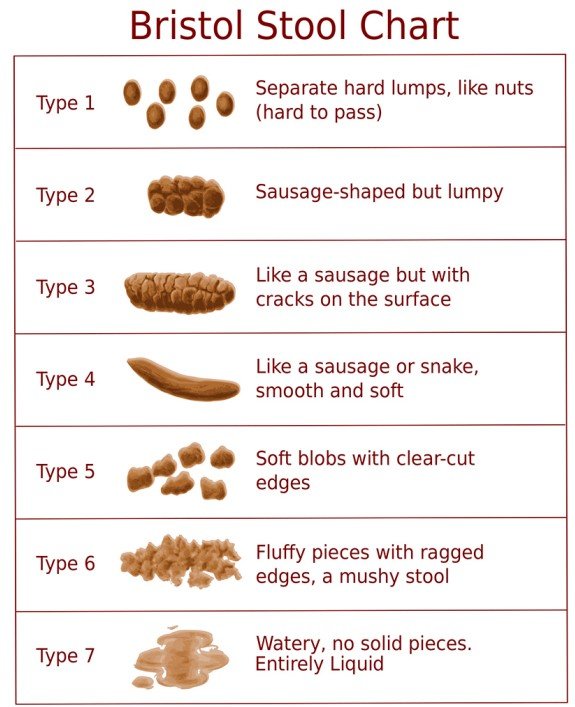Bowel Bliss – tips and tricks for happy tummies:
What is constipation?
According to the Rome Criteria (the gold standard for defining chronic constipation) constipation must include two or more of the following:
· Straining (more than 25% of the times)
· Lumpy or hard stool (more than 25% of the times)
· Sensation of incomplete evacuation (more than 25% of the times)
· Sensation of blockage (more than 25% of the times)
· Manual manoeuvres to facilitate a movement (more than 25% of the times)
· Fewer than three soft bowel movements per week
· Insufficient criteria for IBS (irritable bowel syndrome)
Constipation according to the Bristol stool chart (types 1 and 2)
Constipation in children can be caused by a variety of factors such as:
1. Diet: If your child is not getting enough fibre in their diet or is not drinking enough water, this can cause constipation. Foods that are high in fibre, such as fruits, vegetables, and whole grains, can help keep things moving smoothly.
2. Lack of Physical Activity: Exercise and physical activity help stimulate the muscles in the intestines, which can help prevent constipation. If your child is not getting enough exercise, this can contribute to constipation.
3. Holding in Stool: Children may hold in their bowel movements if they are afraid to use public restrooms or if they are busy playing or doing other activities. This can cause stool to become hard and difficult to pass, leading to constipation.
Here are some natural treatments that may help relieve constipation:
1. Increase Fibre Intake: Eating more fibre can help soften stools and make them easier to pass. Encourage your child to eat more fruits, vegetables, whole grains, and legumes. According to Dr. Leila Masson “Dietary fibre from vegetables, fruits and wholegrains increases microbiome diversity - fibre supplements don’t”. Some good options for high-fibre snacks include apple slices, carrot sticks, and hummus with whole wheat crackers.
2. Increase Fluid Intake: Make sure your child is drinking enough water throughout the day. Water can help keep stools soft and prevent constipation.
3. Encourage Regular Bathroom Breaks: Encourage your child to use the bathroom regularly, especially after meals. This can help prevent stools from becoming hard and difficult to pass.
4. Get Moving: Exercise can help stimulate the muscles in the intestines and promote bowel movements. Encourage your child to be active every day, whether it's playing outside, riding a bike, or dancing to music.
5. Magnesium supplements, for example, are effective at emptying the bowel. Magnesium is a mineral that can help relieve constipation by relaxing muscles and increasing the amount of water in the colon making bowel movements easier and more comfortable. Magnesium can also help increase stool volume and frequency of bowel movements.
6. Try Natural Laxatives: Some natural laxatives, such as prunes or prune juice, can help relieve constipation. You can also try giving your child a teaspoon of aloe vera juice to help stimulate bowel movements. Fruit such as dragon fruit, kiwi fruit and berries are bulk forming and stimulant laxatives and will increase intestinal motility.
7. Use a Squatty Potty: Using a small stool to elevate your child's feet while they're on the toilet can help promote a more natural bowel movement position, making it easier to go.
8. Herbal teas such as chamomile can help calm the tummy.
9. Having breakfast in the morning can stretch the stomach and activates the gastrocolic reflex, a physiological reflex which helps regulate the movement of food through the lower digestive tract.
10. Taking certain strains of probiotics can help restore bowel movement frequency.
References:
Lynda Gripatrick, 2023, A Practical Approach to Constipation (Designs for Health webinar).
Dr. Leila Masson, 2023, Nutrition webinar.
Here's a chart to help you figure out if your child is constipated:


